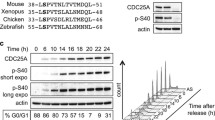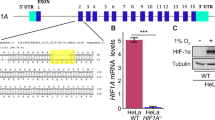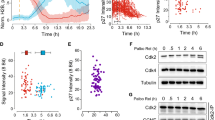Abstract
Exposure of CV-1P cells to hypoxic conditions results in reversible cell cycle arrest concomitant with accumulation of pRB in the hypophosphorylated, growth suppressive form. Similar to cell cycle arrest induced by serum starvation, we show here that hypoxia-induced arrest is accompanied by a decrease in pRB-directed CDK4 and CDK2 activities, lower cyclin D and E protein levels, and by an increase in p27 protein abundance. Immunoprecipitation studies reveal an increase in p27 association with cyclin E-CDK2 complexes. In contrast to cell cycle arrest induced by serum starvation, hypoxia increases PP1-mediated pRB dephos-phorylation. These data reveal that synergy between decreased pRB-directed cyclin/CDK activity and increased pRB-directed phosphatase activity contribute towards inducing and maintaining pRB in its hypophos-phorylated, growth suppressive state during hypoxia.
Similar content being viewed by others
Author information
Authors and Affiliations
Rights and permissions
About this article
Cite this article
Krtolica, A., Krucher, N. & Ludlow, J. Hypoxia-induced pRB hypophosphorylation results from downregulation of CDK and upregulation of PP1 activities. Oncogene 17, 2295–2304 (1998). https://doi.org/10.1038/sj.onc.1202159
Received:
Revised:
Accepted:
Published:
Issue Date:
DOI: https://doi.org/10.1038/sj.onc.1202159
- Springer Nature Limited
Keywords
This article is cited by
-
MART-10 represses cholangiocarcinoma cell growth and high vitamin D receptor expression indicates better prognosis for cholangiocarcinoma
Scientific Reports (2017)
-
Hypoxia-Inducible Factors and Cancer
Current Sleep Medicine Reports (2017)
-
Hypoxia inducible prolyl hydroxylase PHD3 maintains carcinoma cell growth by decreasing the stability of p27
Molecular Cancer (2015)
-
Cell cycle progression in response to oxygen levels
Cellular and Molecular Life Sciences (2014)
-
HIF-1α and iNOS levels in crucian carp gills during hypoxia-induced transformation
Journal of Comparative Physiology B (2006)




